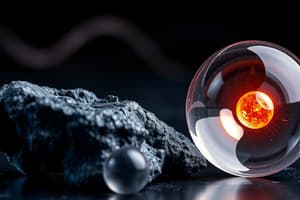Podcast
Questions and Answers
What is the characteristic of particles in a solid state of matter?
What is the characteristic of particles in a solid state of matter?
- Particles have complete freedom of movement.
- Particles are closely packed and vibrate in place. (correct)
- Particles are ionized and electrons are free to move.
- Particles have some freedom of movement.
What is the measure of the amount of matter in an object?
What is the measure of the amount of matter in an object?
- Mass (correct)
- Buoyancy
- Volume
- Density
What is the term for the process in which one or more substances are converted into new substances?
What is the term for the process in which one or more substances are converted into new substances?
- Chemical Reaction (correct)
- Matter Cycle
- Physical Property
- Chemical Equation
What is the law that states that matter cannot be created or destroyed, only converted from one substance to another?
What is the law that states that matter cannot be created or destroyed, only converted from one substance to another?
What is the process by which water is circulated between the Earth and atmosphere?
What is the process by which water is circulated between the Earth and atmosphere?
What is the state of matter characterized by particles having complete freedom of movement?
What is the state of matter characterized by particles having complete freedom of movement?
What is the term for the ability of an object to float or sink in a fluid?
What is the term for the ability of an object to float or sink in a fluid?
What is the term for the movement of carbon through the atmosphere, oceans, land, and living organisms?
What is the term for the movement of carbon through the atmosphere, oceans, land, and living organisms?
What is the symbolic representation of a chemical reaction?
What is the symbolic representation of a chemical reaction?
What is the state of matter characterized by particles occupying the same quantum state?
What is the state of matter characterized by particles occupying the same quantum state?
Flashcards are hidden until you start studying
Study Notes
States of Matter
- Solid: fixed shape and volume, particles are closely packed and vibrate in place
- Liquid: takes the shape of its container, particles have some freedom of movement
- Gas: takes the shape and volume of its container, particles have complete freedom of movement
- Plasma: high-energy state, particles are ionized and electrons are free to move
- Bose-Einstein Condensate: extremely low-temperature state, particles occupy the same quantum state
Physical Properties
- Mass: measure of the amount of matter in an object, measured in grams (g) or kilograms (kg)
- Volume: amount of space occupied by an object, measured in liters (L) or milliliters (mL)
- Density: mass per unit volume, measured in g/cm³ or g/mL
- Buoyancy: ability of an object to float or sink in a fluid, dependent on density
Chemical Reactions
- Chemical Reaction: process in which one or more substances are converted into new substances
- Reactants: substances that undergo a chemical change
- Products: substances formed as a result of a chemical reaction
- Chemical Equation: symbolic representation of a chemical reaction, with reactants on the left and products on the right
Conservation of Mass
- Law of Conservation of Mass: matter cannot be created or destroyed, only converted from one substance to another
- Closed System: system in which matter cannot enter or leave, only transformations occur
- Open System: system in which matter can enter or leave, transformation and transport occur
Matter Cycles
- Water Cycle: continuous process by which water is circulated between the Earth and atmosphere
- Carbon Cycle: movement of carbon through the atmosphere, oceans, land, and living organisms
- Nitrogen Cycle: process by which nitrogen is converted between various forms and moved through ecosystems
- Oxygen Cycle: process by which oxygen is circulated between the atmosphere, oceans, and living organisms
States of Matter
- In a solid, particles are closely packed and vibrate in place, resulting in a fixed shape and volume.
- Liquids take the shape of their container, with particles having some freedom of movement.
- Gases take the shape and volume of their container, with particles having complete freedom of movement.
- Plasma is a high-energy state where particles are ionized and electrons are free to move.
- Bose-Einstein Condensate is an extremely low-temperature state where particles occupy the same quantum state.
Physical Properties
- Mass is a measure of the amount of matter in an object, typically measured in grams or kilograms.
- Volume is the amount of space occupied by an object, typically measured in liters or milliliters.
- Density is the mass per unit volume, typically measured in grams per cubic centimeter or grams per milliliter.
- Buoyancy is the ability of an object to float or sink in a fluid, dependent on its density.
Chemical Reactions
- A chemical reaction is a process in which one or more substances are converted into new substances.
- Reactants are the substances that undergo a chemical change.
- Products are the substances formed as a result of a chemical reaction.
- A chemical equation is a symbolic representation of a chemical reaction, with reactants on the left and products on the right.
Conservation of Mass
- The Law of Conservation of Mass states that matter cannot be created or destroyed, only converted from one substance to another.
- A closed system is a system in which matter cannot enter or leave, only transformations occur.
- An open system is a system in which matter can enter or leave, and transformation and transport occur.
Matter Cycles
- The water cycle is a continuous process by which water is circulated between the Earth and atmosphere.
- The carbon cycle is the movement of carbon through the atmosphere, oceans, land, and living organisms.
- The nitrogen cycle is the process by which nitrogen is converted between various forms and moved through ecosystems.
- The oxygen cycle is the process by which oxygen is circulated between the atmosphere, oceans, and living organisms.
Studying That Suits You
Use AI to generate personalized quizzes and flashcards to suit your learning preferences.




